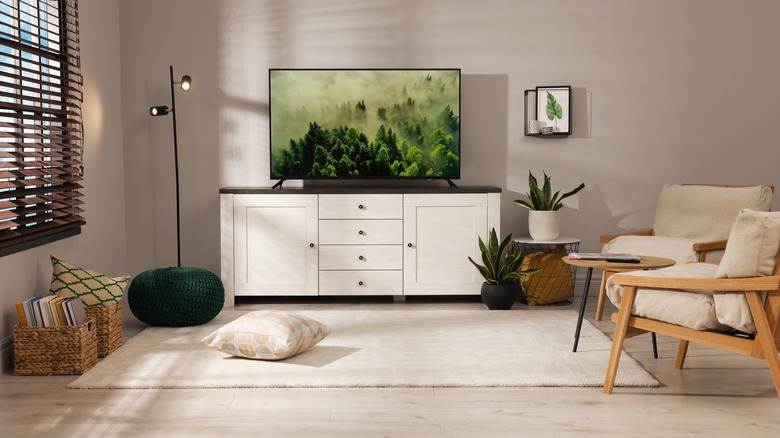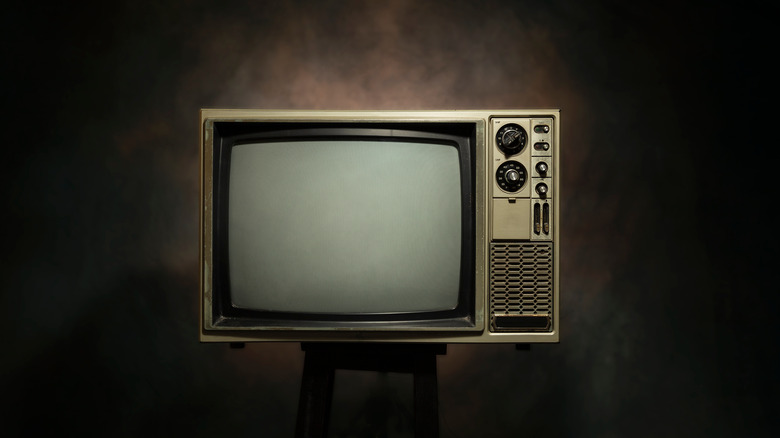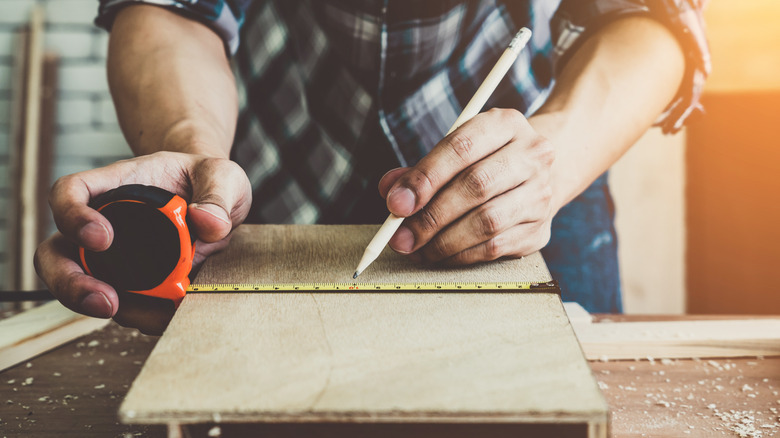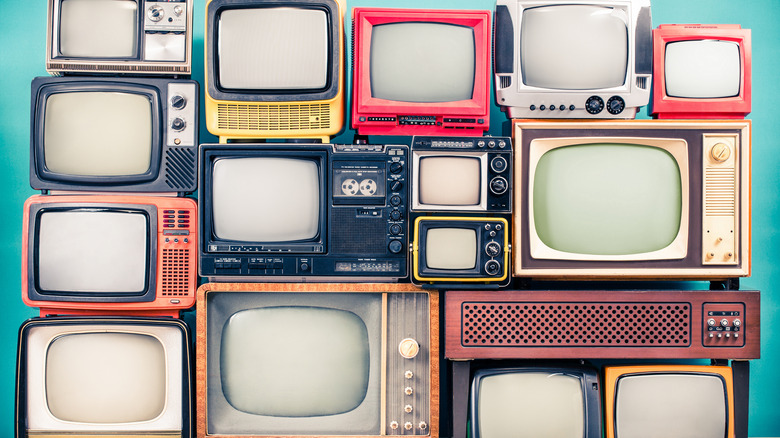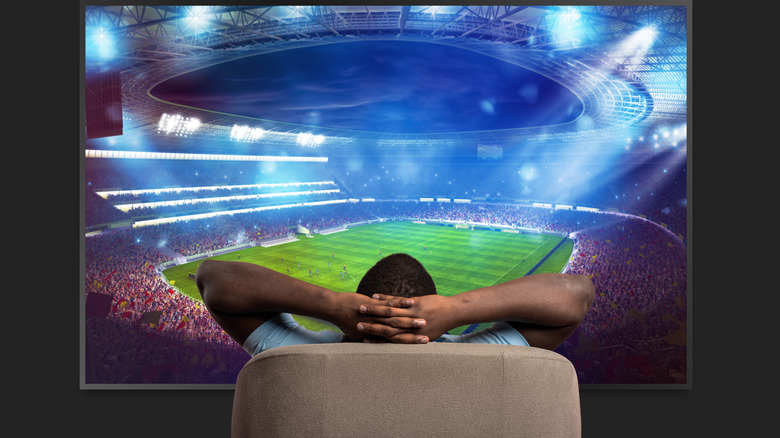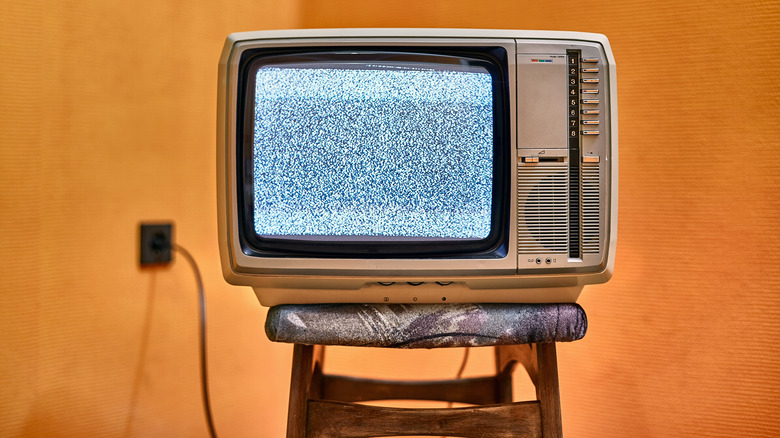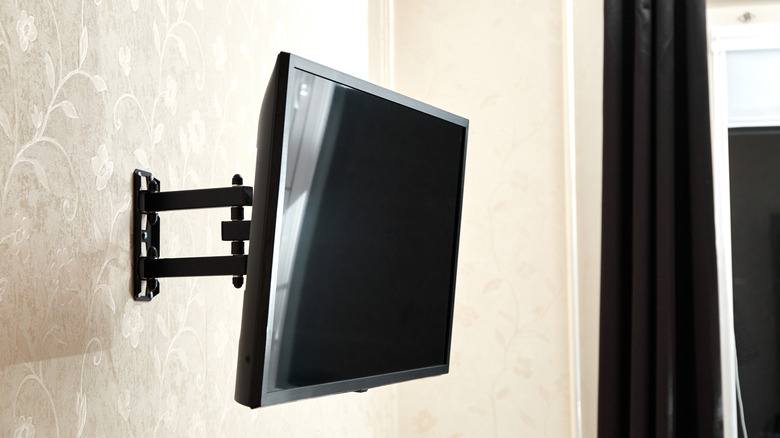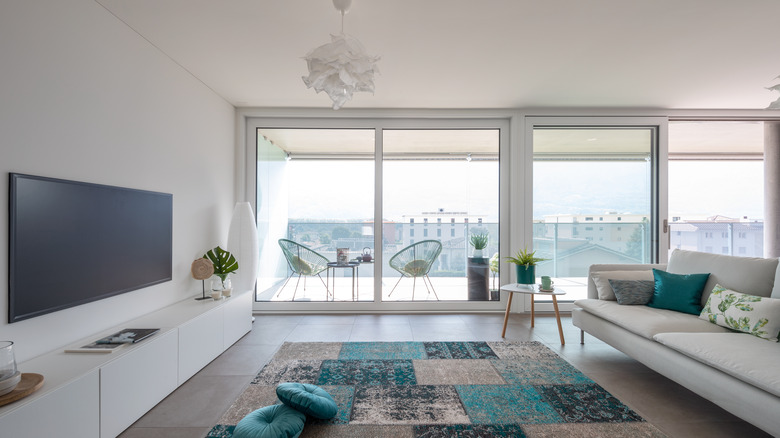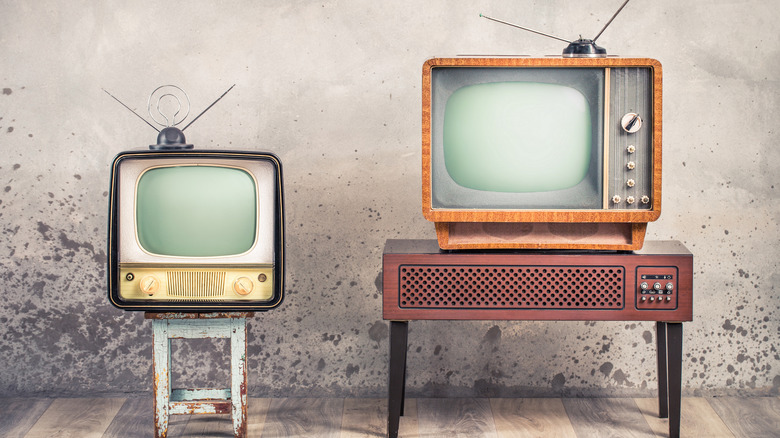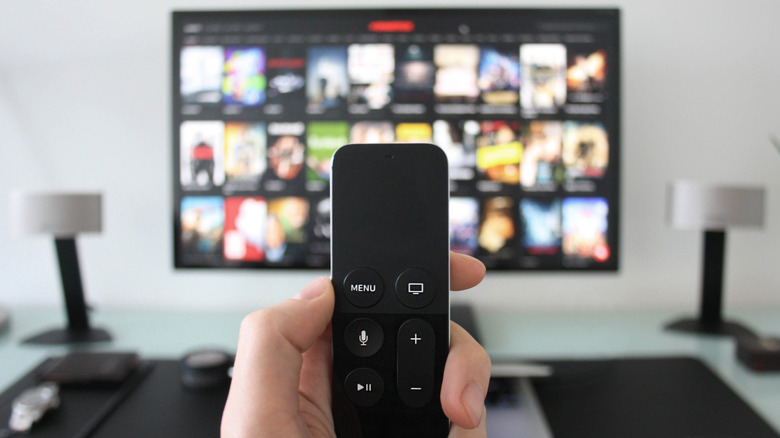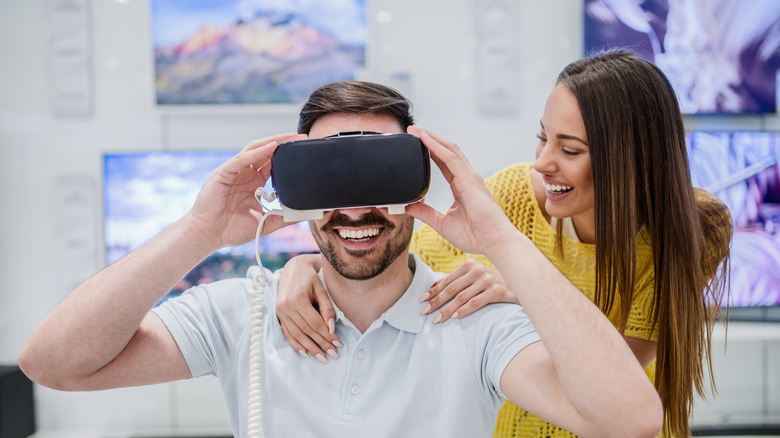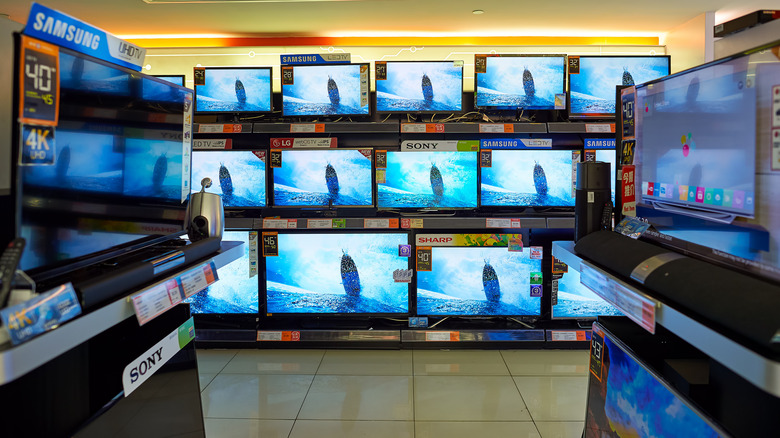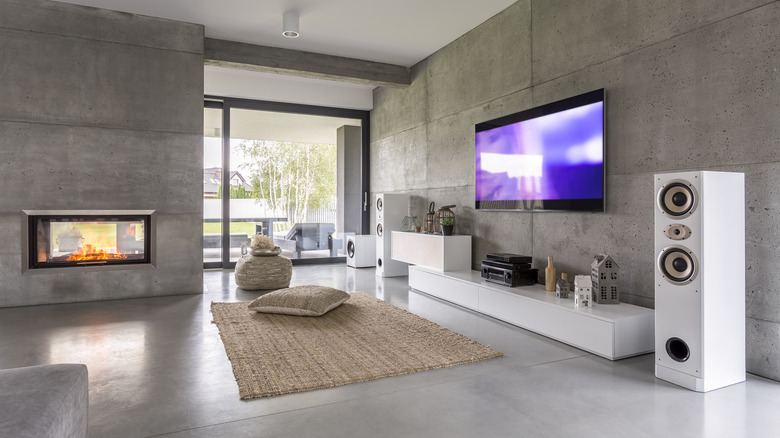Mistakes Everyone Makes When Buying TVs
We may receive a commission on purchases made from links.
Are you an every room in the house has a TV kind of person or more of a minimalist who feels TVs should hide away when not in use? Most of us are somewhere in the middle. However, there's no denying that televisions play an essential role in our households. According to The Guardian, the small box has had a big impact. Since sales boomed in the 1950s, every major event aired on television. We use them to catch up on the news, binge our must-see shows, and relax and forget about a busy day.
A television that works well and suits our lifestyle is an important and necessary addition to a home. You might notice your television the most when it starts to fail. If you've ever sat down to watch the new season of a favorite program, only to find your TV is on the brink, it may have hit you then how important the television is. Understanding the mistakes everyone makes when buying TVs is the first step in ensuring you get the right one for your home, whether replacing an old one or buying a new TV.
When is it time for a new TV?
Televisions aren't cheap, so it's not like you want to run out and buy a new one all the time. According to Best Buy, the average homeowner replaces their televisions every seven to eight years. However, that number is getting smaller as TV prices come down. If something is less expensive, people are willing to upgrade before it's necessary. Still, it's helpful to know when it's time for a new TV. It never hurts to take your time and not spend money before you have to.
Start by considering the age of your TV. If it's over five years old, you may be missing out on things like an improved picture. Opting for a smart television will let you easily stream movies and TV series. Also, think about the size of your home. If you have a small space, it's better to choose a television that won't overwhelm the room. On the other hand, a small TV might look out of place in a large family room. The bottom line is if your TV keeps giving you problems because it's outdated, it's time for a new TV. Be sure to keep it in great shape and clean your flatscreen TV without streaks.
Forgetting to measure the TV stand
It's no fun bringing a shiny new TV home only to find out it doesn't fit your stand. It might seem obvious enough, but in the excitement of television shopping, it's easy to forget to get the exact measurements of the TV stand you have at home.
According to Living Spaces, the perfect height for a TV stand is the distance between the floor and the average sightline of the viewer. For the width of the stand, remember that TV screens are measured horizontally and choose one a few inches wider. For example, if the TV is 50 inches, ensure the console is at least 54 inches, so there's a little room on both sides to make it more stable. Using these methods provides a comfortable viewing experience and a safe TV. Also, choose heavy and strong stands to protect your television from wobbling.
Throwing the old TV away
It no longer works or serves you, so why not just throw the old TV away? There are two good reasons — charity and money. Consider donating the televisions you aren't using. Don't worry about whether they work or not. If they do, that's great. Someone in need could use it. If the TV you're donating doesn't work, someone mechanically inclined might enjoy repairing it. Either way, you're helping someone out.
According to Reviewed, if you aren't sure where to donate your television, give Goodwill, your local library, schools, or Salvation Army a call. They can always use donations, and they sometimes even offer pick-up services. If you're not donating, then consider selling your old TV. It gets you a little pocket change and helps out someone who can't afford a brand-new television themselves. Try Facebook Marketplace or other online garage sale sites for a quick sale.
Squeezing a large TV into a small space
The bigger, the better doesn't always ring true. Everyone wants a large screen flatscreen TV, but not every room can handle it. Today's televisions all feature impressive pictures. No matter what size works well in your space, you'll have a sharp image of whatever you're watching. TVs have only grown over time. According to Radio Times, in 1997, the average TV screen was 22 inches. That number was up to 49 inches by 2020. That's a really big screen, and it's what we've come to expect.
Still, use your room size and seating area to determine the best screen size. It's a good idea to multiply your screen size times 1½ to figure a comfortable seating distance from your TV. For example, for a 32-inch screen, you should sit about 48 inches away. This number is an estimate and not written in stone. In your home, sit and watch TV in the way that makes you most comfortable. However, using the 1½ rule is a good starting point.
Choosing a TV that's too small
Just as some TVs are too big for the room, certain sets can be too small. Practice sitting where you want the TV, and make sure you select a size according to how close you want to be to your new television. If you like to sit further away to avoid eye strain, a small TV won't work well for you.
CNET recommends using a piece of cardboard, cut into the size of the TV you're considering, and taping it to the wall on the spot you'll be putting the actual TV. Take a seat and walk around the room to get a feel for the size of your pretend TV. If it feels lost or awkward, the size may be too small for the room or too far away from the seating area. You can also try propping the cardboard up on a TV stand if that's where you'll be putting the actual TV.
Hanging the TV in an inconvenient spot
Sometimes we become like kids in a toy store when looking at shiny things, such as a new TV. We'll convince ourselves that it'll fit, no problem. However, if your new TV is hanging on the wall, you'll tire of it quickly if it's in an inconvenient spot. Inconvenient might mean the TV is too high, too low, or in the way. Avoid hanging your TV in a position that forces you to turn your neck at an uncomfortable angle. The one place in your home you don't want to put a TV is the bedroom. According to CNET, the heat from a fireplace is not good for your TV, and sitting down and watching it above the fireplace is seldom a good position. It's just too high.
Cables are an issue when hanging your television and could be a reason to find a different spot for your TV or choose a different size when shopping. There's no avoiding the fact that TVs require cables and other annoying cords. When you hang yours, all those cords have to go somewhere. Identify ways to conceal them or use a TV stand. The wires aren't attractive and can even be distracting while watching a show.
Not planning for light from windows
A room with windows can be detrimental to TV viewing if not properly covered. If you prefer uncovered windows, make sure you aren't buying a TV that's going in a room flooded with natural light. If a sunny room is your only choice, you may need to cave and cover your windows with popular curtain styles or blinds. Look for options like shades that roll up so you can still let the sun shine when not binging the latest season of "Stranger Things."
Windows aren't the only issue. Overhead lighting and lamps can also cause TV viewing problems. However, you don't need to ditch the lamps. Instead, place them around the room strategically. According to Lifewire, it's best to put lights beside the television rather than anywhere in front. Even at a distance, the light from a lamp in front of the TV can cause a glare. Overhead lights should be on a dimmer switch so you can easily control the brightness.
Saving money on a TV that's not smart
With so many smart TV options, buying one that's not smart is just not smart. Now that these TVs are commonplace, the price of a new TV has come down (although still an expensive purchase), and it makes no sense to choose a TV without technological advances. Does this mean your TV is unintelligent? Not at all. However, it does mean you're missing out on some advances that make TV viewing at home fun and convenient.
Smart TVs connect directly to the internet, making streaming services a great option. With a smart TV, you can have no cable subscription and still find plenty of shows, thanks to subscription services like Netflix, Prime, Hulu, and many others. According to Lifewire, smart TVs also allow you to connect to gaming, web content, and other media on your computer. You don't have to be a tech lover to appreciate these intelligent televisions. They're an all-around good choice for everyone.
Assuming you're getting a good deal
The tag says "sale," so it must be a good deal. Don't fall for that. Check around online and see what the TV usually costs. You may find it's not much savings at all. Knowing the best times of year to buy a TV is a great way to find the lowest price on your dream television. According to NerdWallet, there are two times to look for during the year when you're ready for a new TV. Those times are Superbowl season (January and February) and Black Friday (the day after Thanksgiving).
Since the Superbowl promises a day of excitement for football fans, many people have a big TV on their minds. It makes sense that businesses selling TVs offer sales during that time so customers will come out and spend. There's also Black Friday, the biggest shopping day of the year. People come out (at crazy hours) ready to score some deals. The stores take advantage of eager shoppers with great sales on electronics, including TVs.
Buying features you'll never use
Don't spend extra on a feature just because it sounds cool. While it might be pretty cool, will you use it? Think long and hard about paying for something you didn't even know you were missing. Most smart TVs have certain features that we expect which you will surely use. Things like streaming or gaming abilities are something every smart TV offers. According to Electronic House, one of the top TV features is speed. If you must pay a little extra to get a fast user interface, go ahead because you won't regret it.
Remember the days of dial-up? It was painful waiting for a simple email to open. While most smart TVs aren't that slow, some have faster speed than others. Just like any purchase, don't get caught up or talked into extras you won't realistically use. Focus on getting the best features you need for your viewing pleasure.
Not experimenting with the features you have
Now that you have the new TV and all those fun features, it's a waste not to experiment with them to find the best settings. Televisions come out of the box ready to go, but with so many settings and features, make sure you find what works best in your home. According to CNET, some great features to look into are built-in casting, 4K streaming, gaming mode, and sleep timer.
The picture probably looks good as soon as you plug in your new TV. That's because technology has become so advanced, and our TV images are incredible. Still, everyone has their preference, and another benefit of advanced technology is that you can adjust your picture to get it exactly the way you like. That's a feature you shouldn't ignore. If changing the TV settings for an improved picture intimidates you (rightfully so), put the settings on Movie or Picture mode because those are usually spot on.
Trusting store demos and salespeople
Hey, we aren't knocking salespeople, but unless they're someone you trust, there's no way they know what's good for you. Go ahead and listen and seek their advice — but trust your gut. Store demos are a great resource when searching for a new TV because they provide a good idea of how the TV sounds and the picture looks. However, remember that you live in a home, not a building designed for pitch-perfect acoustics. Find a trustworthy salesperson or shop online if you prefer.
According to Reader's Digest, stores aren't making a lot of money on the sale of TVs. They're making it on all the accessories and extras. So be sure to make your own decisions and don't get pressured into things you don't need. Cables, mounting materials, and warranties all add up quickly. After hours of exhausting television shopping, salespeople will hit you with all those extras.
Don't forget that sound is important
If you're busy looking for the TV you can find at the right price, don't forget, the sound is just as important. The room you're planning on placing your TV in, plus your TV's sound system, are what to consider when concerned with the overall sound. Hard floors with no rugs may amplify sound as you watch TV, while carpeting softens noises. Your TV will work fine with either, and it's really just a personal preference.
Sound is more than volume. It's feeling the intensity of what's going on in a movie or show. Great sound adds reality to what we're watching. Adjust the settings if the sound in your favorite action movie is disappointing. If that doesn't help, according to Freeview, you may need a set of external speakers to get your sound system where you want it. Sometimes they're a better option, and you can do without the internal speakers. That doesn't necessarily mean you don't have a good TV — it just means you appreciate excellent sound and need additional speakers to make things perfect.
Forgetting to accessorize your new TV
You know how to accessorize your outfits, but did you know you shouldn't walk out of the electronics store without accessorizing your TV? Things like cables, hanging kits, and anything to improve the use of your TV are ideal accessories. However, be careful because over-accessorizing leads to spending more money. Still, some things for your new TV are necessary. Two essential items are a universal remote and mounting hardware.
According to CableCompare, universal remotes make switching from one device to another simple. They usually require just the push of a button to move back and forth between components of the TV. Sometimes in our homes, the remotes stack up, and it can be frustrating to remember which one does what. If you plan on hanging your TV, mounting hardware is essential. Make sure you get the right size and strength for the job. If you aren't comfortable installing the TV yourself, hire a professional. A fallen TV is disastrous, as is the possible hole left in the wall.
